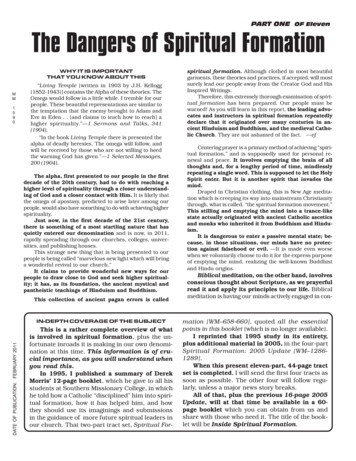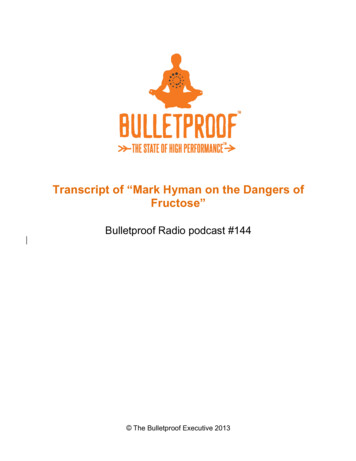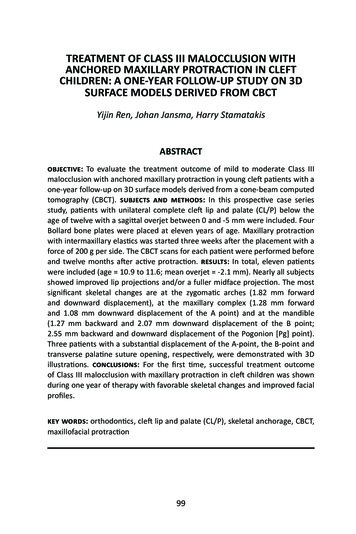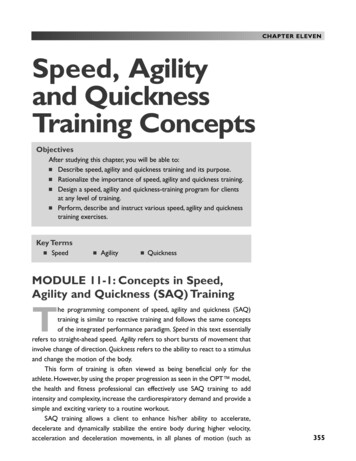
Transcription
PART ONE OF ElevenThe Dangers of Spiritual FormationWHY IT IS IMPORTANTTHAT YOU KNOW ABOUT THISWM1590“Living Temple [written in 1903 by J.H. Kellogg(1852-1943)] contains the Alpha of these theories. TheOmega would follow in a little while. I tremble for ourpeople. These beautiful representations are similar tothe temptation that the enemy brought to Adam andEve in Eden . . [and claims to teach how to reach] ahigher spirituality.”—1 Sermons and Talks, 341(1904).“In the book Living Temple there is presented thealpha of deadly heresies. The omega will follow, andwill be received by those who are not willing to heedthe warning God has given.”—1 Selected Messages,200 (1904).The alpha, first presented to our people in the firstdecade of the 20th century, had to do with reaching ahigher level of spirituality through a closer understanding of God and a closer contact with Him. It is likely thatthe omega of apostasy, predicted to arise later among ourpeople, would also have something to do with achieving higherspirituality.Just now, in the first decade of the 21st century,there is something of a most startling nature that hasquietly entered our denomination and is now, in 2011,rapidly spreading through our churches, colleges, universities, and publishing houses.This strange new thing that is being presented to ourpeople is being called “marvelous new light which will bringa wonderful revival to our church.”It claims to provide wonderful new ways for ourpeople to draw close to God and seek higher spirituality; it has, as its foundation, the ancient mystical andpantheistic teachings of Hinduism and Buddhism.This collection of ancient pagan errors is calledDATE OF PUBLICATION: FEBRUARY 2011IN-DEPTH COVERAGE OF THE SUBJECTThis is a rather complete overview of whatis involved in spiritual formation, plus the unfortunate inroads it is making in our own denomination at this time. This information is of crucial importance, as you will understand whenyou read this.In 1995, I published a summary of DerekMorris’ 12-page booklet, which he gave to all hisstudents at Southern Missionary College, in whichhe told how a Catholic “disciplined” him into spiritual formation, how it has helped him, and howthey should use its imaginings and submissionsin the guidance of more future spiritual leaders inour church. That two-part tract set, Spiritual For-spiritual formation. Although clothed in most beautifulgarments, these theories and practices, if accepted, will mostsurely lead our people away from the Creator God and HisInspired Writings.Therefore, this extremely thorough examination of spiritual formation has been prepared. Our people must bewarned! As you will learn in this report, the leading advocates and instructors in spiritual formation repeatedlydeclare that it originated over many centuries in ancient Hinduism and Buddhism, and the medieval Catholic Church. They are not ashamed of the fact. —vfCentering prayer is a primary method of achieving “spiritual formation,” and is supposedly used for personal renewal and peace. It involves emptying the brain of allthoughts and, for a lengthy period of time, mindlesslyrepeating a single word. This is supposed to let the HolySpirit enter. But it is another spirit that invades themind.Draped in Christian clothing, this is New Age meditation which is creeping its way into mainstream Christianitythrough, what is called, “the spiritual formation movement.”This stilling and emptying the mind into a trance-likestate actually originated with ancient Catholic asceticsand monks who inherited it from Buddhism and Hinduism.It is dangerous to enter a passive mental state; because, in those situations, our minds have no protection against falsehood or evil. —It is made even worsewhen we voluntarily choose to do it for the express purposeof emptying the mind, realizing the well-known Buddhistand Hindu origins.Biblical meditation, on the other hand, involvesconscious thought about Scripture, as we prayerfulread it and apply its principles to our life. Biblicalmeditation is having our minds actively engaged in con-mation [WM–658-660], quoted all the essentialpoints in this booklet (which is no longer available).I reprinted that 1995 study in its entirety,plus additional material in 2005, in the four-partSpiritual Formation: 2005 Update [WM–12861289].When this present eleven-part, 44-page tractset is completed, I will send the first four tracts assoon as possible. The other four will follow regularly, unless a major news story breaks.All of that, plus the previous 16-page 2005Update, will at that time be available in a 60page booklet which you can obtain from us andshare with those who need it. The title of the booklet will be Inside Spiritual Formation.
222templating God’s Word. James 4:7 says to “submit toGod, resist the devil, and he will flee from you.” Resistance is key to remaining alert and cautious, and requires a thinking mind that has submitted to the control of God.The peace experienced in Christian meditation isnot found by looking “within” or imagining that we arebecoming gods. Rather, peace comes by humbly, obediently looking to the Creator God of the Bible. Whenwe thoughtfully consider God’s truth in our minds, theHoly Spirit works to change our hearts and leads usinto fuller knowledge and obedience.“This book of the law shall not depart out of thymouth; but thou shalt meditate therein day andnight, that thou mayest observe to do according toall that is written therein: for then thou shalt makethy way prosperous, and then thou shalt have goodsuccess.”—Joshua 1:8.The effects of spiritual formation practices on themind are remarkably similar to that of hypnotism orattendance at a spiritualist seance. (For much moreon hynotism, see my 82-page Hypnotism Tractbook.)“The Protestants of the United States will beforemost in stretching their hands across the gulfto grasp the hand of spiritualism; they will reachover the abyss to clasp hands with the Romanpower; and under the influence of this threefoldunion, this country will follow in the steps of Romein trampling on the rights of conscience.”—GreatControversy, 588.The hand of spiritualism, through the movement ofspiritual formation with all its associated dangers, iseven now being grasped by the hand of Protestantism;and we, as Seventh-day Adventists, are in grave danger as we are being brought face to face with thismovement. Far too many of our people are yielding toit!In a view into the last days—in which we are nowentering—we see this:“This delusion will spread, and we shall haveto contend with it face to face; and unless we areprepared for it, we shall be ensnared and overcome. . .“I saw the rapidity with which this delusion[spiritualism] was spreading. A train of cars wasshown me, going with the speed of lightning. Theangel bade me look carefully. I fixed my eyes uponthe train. It seemed that the whole world was onboard. . . Then he showed me the conductor, whoappeared like a fair, stately person, whom all thepassengers looked up to and reverenced. I was perplexed and asked my attending angel who it was.He said, ‘It is Satan. He is the conductor, in theform of an angel of light. He has taken the worldcaptive. . . And they are all going with lightningspeed to perdition.’ ”—Early Writings, 88.Waymarks————————————— SECTION ONE —NOW IN THE OTHER BACK AND WILLOW CREEKTwo of the largest and most influential Protestantchurches are Rick Warren’s Saddleback Church, insouthern California, and Willow Creek in northernIllinois.Rick Warren praises spiritual formation:“From time to time God has raised up aparachurch movement to reemphasize a neglected purpose of the church: . . [This is] theDiscipleship, Spiritual Formation Movement. Areemphasis on developing believers to full maturity has been the focus . . of authors such as . .Richard Foster and Dallas Willard, who have underscored the importance of building up Christiansand establishing personal spiritual disciplines. . .[This] movement has a valid message for thechurch. . . [It] has given the body a wake-up call.”—Rick Warren, The Purpose Driven Church, p. 126.An official statement by Willow Creek has this message:“The practice [of spiritual formation at] Saturday morning meetings provides a rhythm of worship, teaching on a particular spiritual disciplineand time to experience or “practice” that discipline.This practice time allows participants to get afuller understanding of how to incorporate thediscipline into their daily lives.”—Spiritual Formation at Willow Creek.Ruth Haley Barton, former Associate Director ofSpiritual Formation at Willow Creek CommunityChurch, wrote this:“A few years ago, I began to recognize an innerchaos in my soul. . . No matter how much I prayed,read the Bible, and listened to good teaching, I couldnot calm the internal roar created by questionswith no answers.“I sought out a spiritual director, someone wellversed in the ways of the soul. . . Eventually thiswise woman said to me . . ‘What you need is stillness and silence so that the sediment can settleand the water can become clear.’ . . I decided toaccept this invitation to move beyond my addiction to words.”—Ruth H. Barton, “Beyond Words:Experience God’s Presence in Silence and Solitude.”Richard Foster (a Catholic priest and prominentleader in the Catholic/Protestant spiritual formationmovement who, as we will learn in this report, has ledout in connecting spiritual formation closely with itsancient roots in Catholicism and Buddhism), author ofthe Spiritual Formation Bible, has written this:“By now enough water has gone under the Chris-
33The Dangers of Spiritual FormationWM1590tian Spiritual Formation bridge that we can givesome assessment of where we have come and whatyet needs to be done. When I first began writing inthe field in the late 70s and early 80s the term‘Spiritual Formation’ was hardly known, exceptfor highly specialized references in relation tothe Catholic orders. Today it is a rare person whohas not heard the term. Seminary courses in spiritual formation proliferate like baby rabbits. Hugenumbers are seeking to become certified as spiritual directors to answer the cry of multipliedthousands for spiritual direction.”—Richard Foster, Spiritual Formation, a Pastoral Letter.Larry Crabb predicts that spiritual formation willbe a key element in bringing the full power of theHoly Spirit into the churches:“The next reformation is due. It will focus onwhat it means to know God with a power thatchanges who we are and how we relate. I predictthe Spiritual Formation Forum will play a vital rolein the Spirit’s next great movement.”—LarryCrabb, The Association of Christian Counselors.SOUTHERN BAPTIST SEMINARIESSpiritual formation has spread so rapidly throughthe Protestant Churches, that it is now even beingtaught in Southern Baptist seminaries. Don Whitney,a seminary professor in the Southern Baptist seminary,authored a May 5, 2005, news release: “The Importanceof Spiritual Formation in the Training of Ministers.”He was formerly Assistant Professor of Spiritual Formation at Midwestern Baptist Theological Seminaryin Kansas City, Missouri. Later he moved to the Southern Baptist Theological Seminary in Louisville, Kentucky.“Louisville, KY—The Southern Baptist Theological Seminary recently appointed to its faculty notedspiritual disciplines scholar Donald S. Whitney toteach in the new professorship of biblical spirituality and to pioneer a doctoral program in Christian spirituality.”—Southern Baptist TheologicalSeminary.Thus even America’s largest “Protestant” denomination—and its most conservative,—is going full speedinto spiritual formation.One internet listing of Protestant seminaries (wherefuture pastors are trained) brags that “over a thousandseminaries around the world” now include spiritual formation as required in their master’s and doctoral degree programs.“Examine Spiritual Formation Doctoral Degrees, offered by 1000 top accredited universities & colleges. Find detailed information, contact. .”—emagister/net/doctrinal degrees.METHODIST SEMINARIESHere is another example. It is part of the GeneralBulletin for Duke University, a United Methodist3school:“Duke University, Academics, Spiritual Formation—Each first-year student has been prayerfully placed in a small, intentionally diverse spiritual formation group. These groups are led by local pastors, many of whom are Duke Divinityalumni. Each week the groups gather to share concerns and to reflect theologically on the nature ofChristian discipleship.“Sponsored by the Chaplain’s Office of Duke Divinity School, attendance at one of these retreatsfulfills the M.Div. requirement for Spiritual Formation.“As part of the spiritual formation experience,students are also to be invited to take time apartfrom their studies to attend two spiritual retreats,one each semester.“Founded in 1926 as the first of the university’sgraduate professional schools, the Divinity Schoolattracts students from across the nation andaround the world. One of 13 seminaries foundedand supported by the United Methodist Church,the school has from its beginnings been ecumenical in aspiration, teaching, and practice.“I recently took a seminary course on the bookof Luke. It was a summer intensive and was one ofonly two classes being offered at the time. Aboutmidway through the week, while the class wassteeped in trying to discern the intent and significance of the book of Luke, we began to hear theechoes of mystic chanting coming through thewalls.“As it turned out, the other class being offeredwas parked right next to ours. The paper thin wallswere carrying the choruses of a class exploringthe life and teachings of Catholic mystic HenryNouwen. We proceeded, trying to concentrate onstudying the Scriptures while tuning out the chantsthat were carrying on next door.“Perhaps what was more unsettling though isthe class studying Nouwen was chock full, whilethere were plenty of empty seats next door for anyone wanting to learn about the inspired book ofLuke.”—Ryan Habbena, commenting on a Baptist seminary course during the summer of 2005at Bethel Theological Seminary in Arden Hills,MN.How can this be? A Methodist seminary was favorably studying the teachings of this Catholic mystic,whose own biographers describe as having had emotional problems and homosexual inclinations.“I met a lady who attends a Christian college.As part of her study program she was required totake a course on spiritual formation at her college. Spiritual formation in her class also concerned the study of Roman Catholic mystics and
444Waymarksthe search for techniques to help those whoimplement them feel closer to God. This studyalso explored ‘spiritual disciplines’ which promised to make those who practiced them moreChrist-like.”CHRISTIANITY TODAYChristianity Today, the leading Evangelical magazine in existence today, has an article by Richard Foster, the acknowledged leading writer and speaker atthis time in the spiritual formation movement (and aCatholic priest). He says:“There is a more than 2,000-year record ofgreat ones in this [spiritual formation] life—Augustine and Francis and Teresa and à Kempisand many more [all Catholics]—who, by followinghard after Jesus in this way, became persons ofabsolute sterling character. The record is there foranyone who wants to see. . .“Christians of all sorts now know about the needfor spiritual formation, and look to saints—Catholic, Orthodox, and Protestant—for guidance. . .In our day, the desperate need is for the emergence of a massive spiritual army of trained spiritual directors. . .“Let us do all we can to develop the ecclesiola inecclesia—’the little church within the church.’ Theecclesiola in ecclesia is deeply committed to thelife of the people of God and is not sectarian in anyway. No separation. No splitting off. No settingup a new denomination or church. We stay withinthe given church structures and develop littlecenters of [spiritual formation] light within thosestructures.”—Richard Foster, “Spiritual Formation Agenda,” Christianity Today, January 2009.RAPIDLY PENETRATING OUR OWN CHURCHSpiritual formation is rapidly spreading throughout our own denomination and is being taught in ourSeminary at Andrews University.Sections Four and Five of this report will explain that in some detail. Much more on this Adventistconnection there.This in-depth analysis of spiritual formation andits inroads is being prepared because of this rapidpenetration of that devilish error into our midst. Ourpeople must be warned about this; and they must beshown what it involves—so they can avoid the slightest participation in it!————————————— SECTION TWO —LEADERS AND AMES YOU SHOULD BE AWARE OFBefore providing you with additional facts about theMore WAYMARKS - from ——————P I L G R I M Sinroads of spiritual formation in our denomination,—itis urgent that you learn (1) its code words; (2) thenames of its most influential, interdenominationalleaders; and (3) the names of key practices used inspiritual formation, to draw your mind into control bydemons.Please understand: When spiritual formation is firstpresented to you, it will appear to be very nice. But theconcepts and methods used to put it into your life practice have sinister results. You may not feel any differentafter each contact; but a demon has been permitted tostart implanting thoughts in your mind, there to steadilywork to cause you to swerve more fully into wrong pathsand away from God. One of those thoughts will be asense of depression, urging you to keep returning to theseapparently meaningless sessions.You need to know in advance the special words,names, and key practices—so you can avoid its firststealthy approach when a friend, teacher, or pastorpresents it to you! I am sorry to have to tell you thatindividuals and church articles may attempt to lure youinto it. Those men and women have earlier been enticedinto “mind-expanding experiences” in spiritual formation, and now want you to join them in this closer walkwith a spirit.The peace experienced in Christian meditation isnot found by repeating certain words or looking“within” for guidance.Peace comes by looking to God; studying His Inspired books (the Bible and Spirit of Prophecy); and,through the enabling grace of Christ, obeying His TenCommandment law. The Holy Spirit does not changelives apart from their willing submission to God andhumble obedience to Him.NAMES BY WHICH IT IS CALLED“I am here because our president, Dr. MarkCoppenger, believes that vigorous spiritual formation is both the antidote and the preventivefor many rampant ministerial problems. He believes this so strongly that the creation and fillingof the chair of spiritual formation was the firstchange in the faculty he made upon arriving at Midwestern Seminary in 1995.”—Don Whitney, “TheImportance of Spiritual Formation in the Training of Ministers.”One of the new names for this movement is the“emerging spirituality.” It is presented as a wonderfulnew experience which leads the soul closer to God, aspiritual fullness which is emerging, bursting out in theschools and churches of Christendom.This movement, through its emphasis on theteachings of the “Desert Fathers” (the Catholic mystics of ancient times), is in reality leading many Protestants back into the arms of Rome and Eastern mys-RESTContinued on the next tract1288 MYERS TOWN ROAD - BEERSHEBA SPRINGS, TN 37305 USA
The Dangers of Spiritual FormationContinued from the preceding tract in this seriesWM1591ticism. In order to be on guard, you need to be aware ofthe seemingly harmless code words used to describespiritual formation:Some of the various names under which thesestrange concepts are entering our denomination are theEmerging Church, ReFormation, Renovarè, Rethink, New Think, and Emerging Spirituality.Terms you will find in this Emergent Movementare: Prayer Stations, Breath Prayers, Lectio Divina,Taize, The Silence, Sacred Space, Ancient PrayerPractices, A Thin Place, Spiritual Direction, Ignation Contemplation, Contemplative, Centering, Centering Prayer, Divine Center, Inner light, Mantra,Beyond Words, Spiritual Disciplines, Spiritual Formation, Prayer Labyrinths, and Prayer Rooms.RETURNING TO ANCIENT “TRADITIONS”You will be told that these are just a new revival ofancient “traditions.” That is true. Roman Catholicshave used these practices for centuries. They originally came from the Eastern religions, through themystery religions of Asia Minor. Monasteries and nunneries continue to provide special instruction in themeditative and contemplative disciplines. In addition,“spiritual retreats” have been common among RomanCatholics who seek relief from the stress of every daycares. Their religion does not provide comfort in Christ,and they gladly turn to other things. This is anotherspiritual formation practice now entering Protestantism.Among non-Catholic Christians these contemplativetraditions have played a relatively minor role for centuries. But the hunger for spiritual solutions is still there;because, by living in ongoing sin without obedience toGod’s laws, they crave something that they do not have.In reaction, many are returning to what they call“the great contemplative traditions of early Christianity.” But these traditions are neither first-century Christian nor Biblical in origin. They are Roman Catholic,adopted from pagan religious practices. When proponents of this “return” speak of “early Christianity,” theyreally mean the apostate traditions that result in themonastic-type practices of Roman Catholicism.In many churches, cell groups are springing upwhich offer opportunities for close-knit fellowship withother seekers. Among these, without realizing it, manyare learning and practicing together variations of ancient Buddhism, mingled with strange, new meaningless activity that is called “prayer” and “Bible study.”In addition to meditative and contemplative exercises, they are taught to study the lives of ancientand modern mystics, in order to learn how to have adeeper experience.LEADING SPIRITUAL FORMATION WRITERSHere are several of the prominent spiritual forma-PART TWOOF Elevention authors at this time:Dallas Willard, Richard Foster, David Benner, Kenneth Boa, Larry Crabb, Henri Nouwen, Bruce Demarest,A.W. Tozer, Eugene Peterson, and Martin Sanders.LEADERS IN THIS RELIGIOUS MOVEMENTActively promoting the revival of the meditative andcontemplative traditions among mainline Christianstoday is Renovaré (pronounced ren-o-var-ay; this is aLatin word, meaning “to make new spiritually”). It wasfounded by pseudo-psychologist Richard J. Foster.Like John Wimber of Vineyard International Ministries, it is out of the religious traditions of the Catholics that Foster has come with the startling messagethat today’s Christians are missing out on some wonderful spiritual experiences that can be found only bystudying and practicing the meditative and contemplative methods of monks and mystics of earlier centuriesand other cultures.Co-directing Renovaré at its start was William L.Vaswig, a Lutheran minister whose experience in thereligious disciplines was gained through the ShalemInstitute for Spiritual Formation in Washington, D.C.Several well-known and influential leaders withinChristianity are, or have been, involved with Renovaré.These include Lloyd John Ogilvie, Jack Hayford, G.Raymond Carlson (General Superintendent of the Assemblies of God), David Hubbard (President of FullerTheological Seminary), Jamie Buckingham, AnthonyCampolo, J.I. Packer, John Wimber, David and KarenMains, and C. Peter Wagner of Fuller Theological Seminary, to mention just a few.Other important speakers and writers include:Henri Nouwen, Brennan Manning, Thomas Merton,Rick Warren, Ruth Haley Barton, Thomas Keating,Larry Crabb, Dallas Willard, and Tony Campolo.Here is additional information on some of the leaders in modern spiritual formation:RICHARD J. FOSTERRichard J. Foster is the author of several best-selling books, including Celebration of Discipline. A dedicated Catholic priest, he is the founder of Renovaré,which is committed to “the renewal of spirituality in thechurches.” Renovaré claims to produce Christ-like character in people, beyond that which can be done in anyother way.Foster is also the general editor of the RenovaréSpiritual Formation Study Bible. Our own AdventistNorth American Division strongly recommends RichardFoster’s book, Prayer, Finding the Heart’s TrueHome.It is of interest that Richard Foster is also on theBoard of Reference for the Evangelical feminist group,www.cbeinternational.org , which outright teaches to callGod “mother” while claiming to be “Evangelical.”Foster regularly speaks at various Adventist gath-
666Waymarkserings. One example of this was the NAD Youth/YoungAdult Ministries Leadership Summit, IGNITION, heldFebruary 14-17, 2008, in Dallas.“It will give intentional focus to significant youngadult issues, feature innovations, as well as exhibit effective young adult ministries for the localchurch and campus. . . How do you ensure that ishappening in your life? A good place to start is tolearn from leaders in the spiritual formationfield. John Ortberg and Richard Foster will joinhost George Barna for a challenging and excitinglook at how leaders can be consistently developingtheir spirits during a special CCN broadcast: Spiritual Disciplines for Leaders. . .“Richard J. Foster is the author of several bestselling books, including . . Celebration of Discipline. He is the founder of Renovaré, an infrachurch movement committed to the renewal ofthe Church in all of its multifaceted expressionsand the formation of Christ-like character inpeople.“He is also the general editor of the RenovaréSpiritual Formation Study Bible. AdventistNorth American Division recommends RichardFoster’s book; Prayer, Finding the Heart’s TrueHome.”—Announcement for the NAD Youth/YoungAdult Ministries Leadership Summit, IGNITION,held February 14-17, 2008, in Dallas, Texas.Richard Foster’s book, Celebration of Discipline,which promotes meditative prayer, has sold over twomillion copies.THOMAS MERTONThomas Merton (January 31, 1915 – December 10,1968) was a 20th century British-American Catholicwriter. In 1949, he was ordained to the priesthood andgiven the name Father Louis. He became a Trappistmonk of the Abbey of Gethsemani, Kentucky. He stronglybelieved in mixing the religions. His 1948 book, SevenStorey Mountain, sent scores of disillusioned World WarII veterans, students, and even teenagers to join monasteries across the U.S.He pioneered dialogue with prominent Asianspiritual figures—including the Dalai Lama; D.T.Suzuki, the Japanese writer on the Zen tradition; andthe Vietnamese monk, Thich Nhat Hanh.I first learned about him when, in the 1980s, I wrotea tract set on the way-out Collegiate Quarterly, whichstudents in Adventist colleges and universities are encouraged to study instead of the Senior Quarterly, withits Bible studies. Merton was frequently quoted in theCollegiate Quarterly.(However, in preparation for this article, I find thatfor a number of years now the Collegiate Quarterly hasbeen much more Biblically oriented. I am thankful forthat.)BRENNAN MANNINGBrennan Manning, a leading Catholic speaker inthe spiritual formation movement, gave the Week ofPrayer at Pacific Union College in the fall of 1995.(See our tract set: The Catholic Gospel at Pacific UnionCollege [WM–661-662].) Who is he?Christened Richard Francis Xavier Manning, he isan author, friar, priest, contemplative, and speaker. Heenrolled at Saint Francis University in Loretto, Pennsylvania, in the late 1950s. Upon graduation from a Catholic seminary in 1963, Manning was ordained to theFranciscan priesthood.In the late 1960s, Manning joined the Little Brothers of Jesus of Charles de Foucauld, a religious ordercommitted to an uncloistered, contemplative life amongthe poor. Manning transported water via donkey, workedas a mason’s assistant and a dishwasher in France,was imprisoned (by choice) in Switzerland, and spentsix months in a remote cave somewhere in the ZaragozaDesert. In the 1970s, Manning returned to the U.S. andbegan writing and lecturing after trying to stop his alcoholism.RENOVAREThe writings and influence of Renovaré have beenlikened to the Holy Spirit bringing the many streams ofChristian thought and practice into a single, mightyrushing river.Founded by Richard J. Foster, Renovaré’s methods use four basic disciplines: prayer, meditation,contemplation, and devotional reading. While diversein their applications, all four disciplines are consideredby Renovaré to fall under the basic heading of prayer.The first—prayer itself—is said to be thoughtfulcommunication with God through petition, praise, worship, and other common elements that make up prayeras we know it from Scripture. In this Renovaré is correct. However, in practice, little of this generally occurs.The emphasis is always on meditation, as they interpret it,—and especially contemplation and devotionalreading in the mystics.The second—meditation—is said to be remaining still and letting God speak. It may or may not involve visualization of Jesus in one’s presence or visualization of an action, such as healing, that one may wishaccomplished through this form of “prayer.”The third—contemplation—is basically just sitting still, as a means of being “in the presence of God.”The fourth—devotional reading—primarily involves the reading of selected “spiritual masters”rather than Scripture.All four disciplines may be intermingled. For example, one may begin with prayer; then do devotionalreading; and from there go into meditation, visualization, and contemplation.Such well-known Roman Catholic mystics whotranscend mere Bible teachings (such as Teresa of Avila,John of the Cross [whom Johnston calls “my greatguru”], Thomas Merton, Gregory of Nyssa, etc.) areput forth by both Johnston and Renovar
a seminary professor in the Southern Baptist seminary, authored a May 5, 2005, news release: "The Importance of Spiritual Formation in the Training of Ministers." He was formerly Assistant Professor of Spiritual For-mation at Midwestern Baptist Theological Seminary in Kansas City, Missouri. Later he moved to the South-










